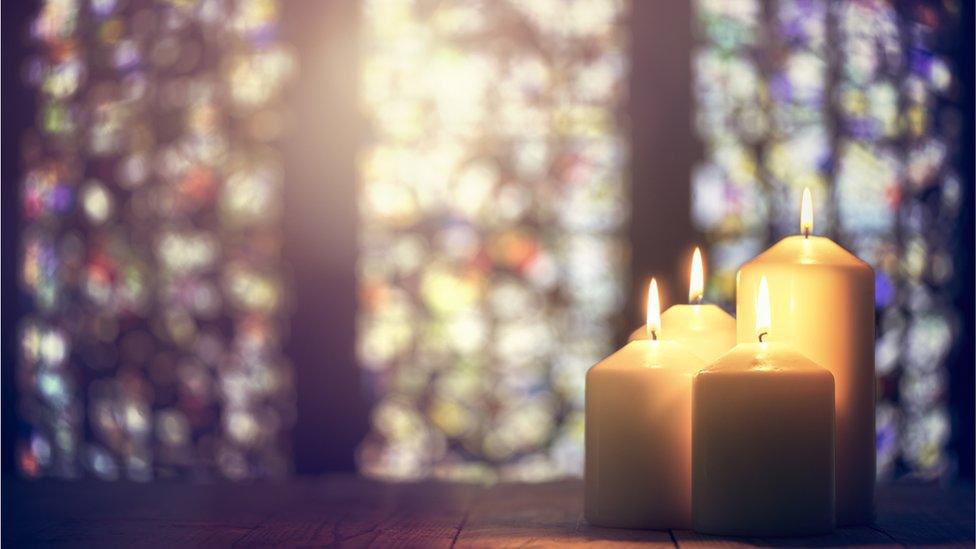Coronavirus: Churches to halt public services until February
- Published
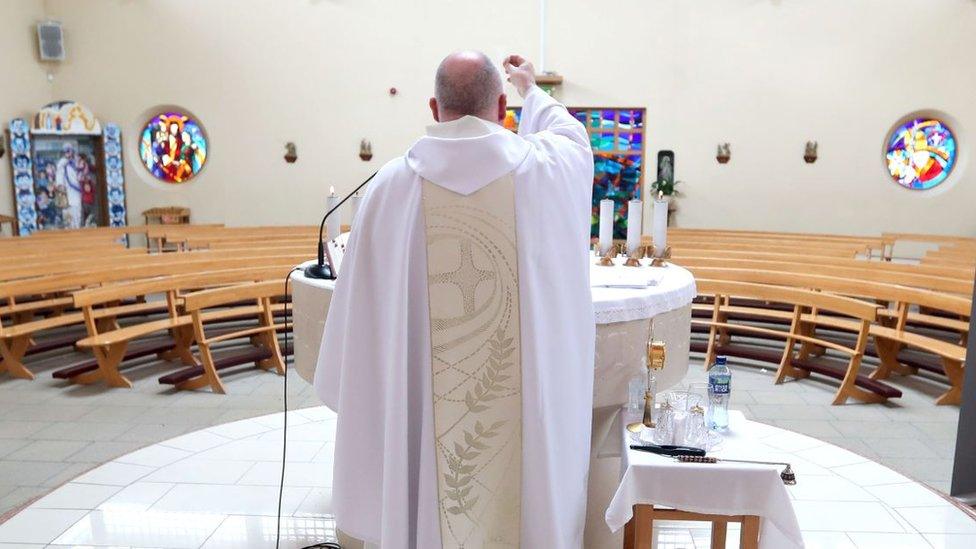
A priest celebrating an online Mass in an empty church during the first lockdown last year
Northern Ireland's main church denominations are to cease public worship until early February.
Church leaders have said they recognise the very serious position Northern Ireland is in due to Covid-19.
In-person gatherings for worship, along with most other church gatherings, are set to cease from midnight on Thursday until Saturday 6 February.
The Catholic Church, Church of Ireland and Presbyterian Churches have all issued statements confirming the move.
The Methodist Church has also confirmed it is halting public services.
Weddings and funerals will continue, as will some baptisms, drive-in services and private prayer.
It comes after a further 17 coronavirus-related deaths were reported on Thursday in Northern Ireland, bringing the Department of Health's death toll to 1,417.
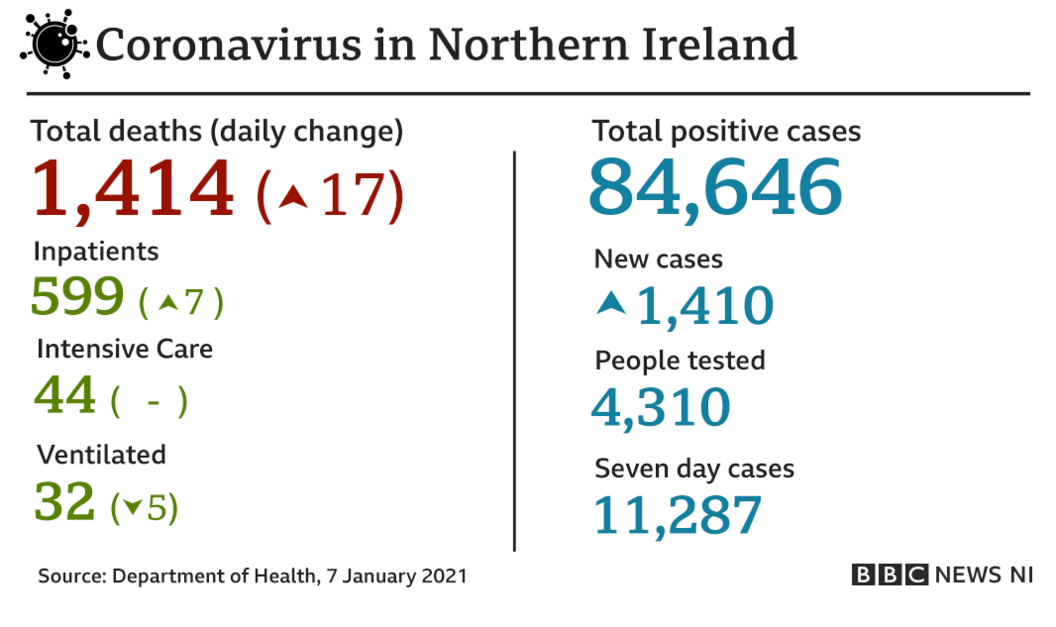
Another 1,410 people have tested positive for Covid-19.
In the Republic of Ireland, there were 10 further coronavirus-related deaths and 6,521 new cases of the disease notified to the Irish Department of Health on Thursday.
Since the start of the pandemic, a total of 2,307 people have died in the Repulic, with the cumulative total number of infections having reached 127,657.
A stay-at-home order will become legally enforceable in Northern Ireland on Friday, meaning the PSNI will have powers to direct people home if they are engaged in prohibited activity.
Anyone caught being away from home without a reasonable excuse can be issued with a £200 fixed penalty notice or a fine of up to £5,000 if the case goes to court.
Regulations against faith?
Earlier, Stormont's junior ministers met faith leaders to discuss moving all religious ceremonies online in a bid to curb rising Covid-19 infections.
Religious buildings were among the few public places allowed to remain open in the current six-week lockdown, during which people have been asked to stay at home.
First Minister Arlene Foster said she was hoping for a "voluntary agreement".
"The last thing that I want to have to do is to put regulations in against faith and against worship," she said.
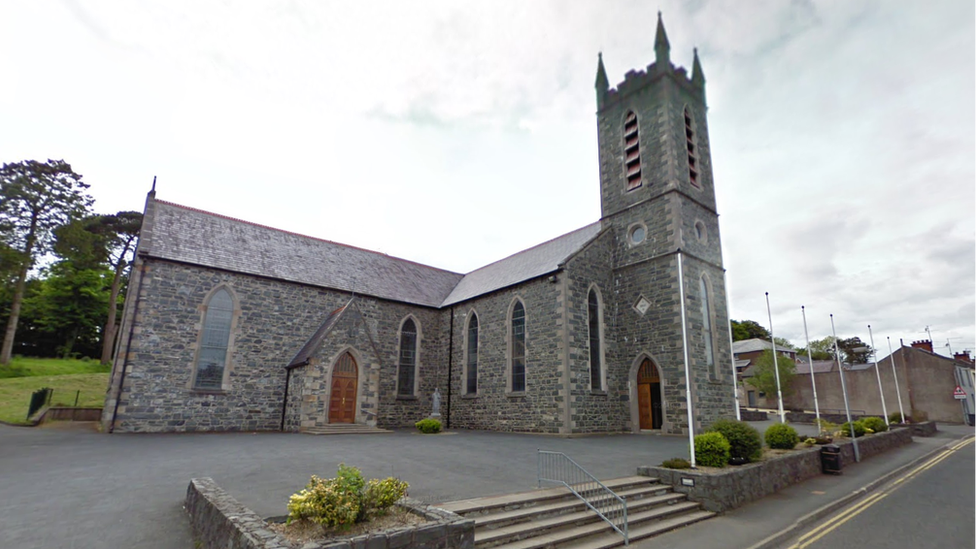
St Patrick’s Church in Keady is one of the largest churches in the Catholic Archdiocese of Armagh in terms of seat capacity
Several congregations had already taken decisions at local level to suspend public worship, temporarily moving their services online-only ceremonies.
The churches that have decided to go digital include two Catholic parishes in the BT60 postcode area of County Armagh, which currently has the highest rate of Covid cases per 100,000 people in Northern Ireland.
The parish of Keady, Derrynoose and Madden, and the neighbouring parish of Tynan and Middletown, announced the changes at the weekend.
The parish secretary in Keady told BBC News NI the decision was made because of concerns over the "rising number of Covid cases in our community".
Separately, the Church of Ireland and Methodist Church both confirmed that in some areas, their clerics and congregations had taken similar decisions.
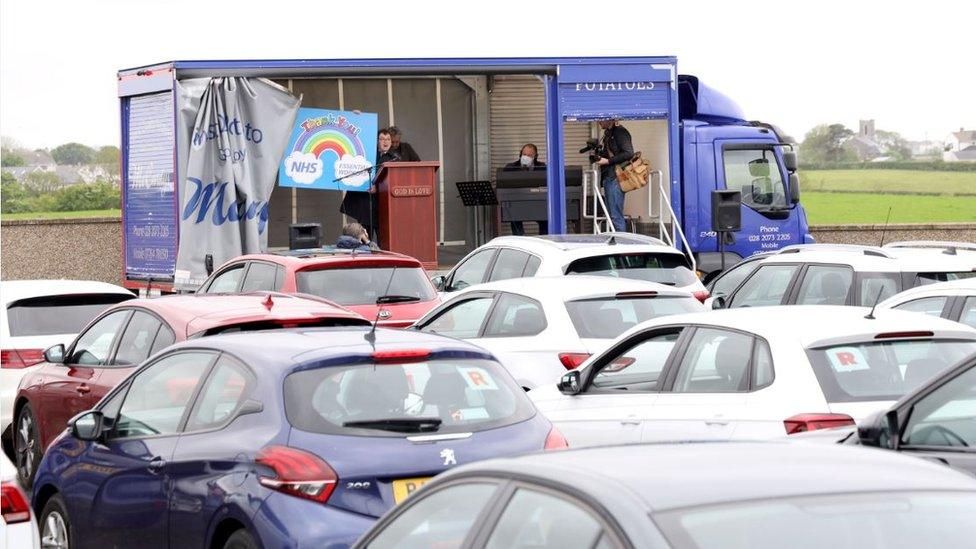
Some churches have been using drive-in services since emerging from the first lockdown last year
The Presbyterian Church in Ireland said it had a range of measures in place to ensure the safety of its members and the community as a whole, but added it was awaiting a decision from the Stormont executive.
On Thursday morning, Ms Foster told the BBC's Good Morning Ulster programme she was reluctant to force churches to shut and "would prefer that we worked together on this issue".
"The last thing that I certainly want to have to do is to put regulations in against faith and against worship, because it is so important for many, many people that they can come together to worship God."

Timeline of disruption
28 March 2020 - In an unprecedented move, churches along with many other public buildings in Northern Ireland are ordered to close to the public under Covid-19 emergency legislation.
In contrast, churches in the Republic of Ireland remain open for individual prayer, but services take place without congregations.
30 April 2020 - Democratic Unionist Party (DUP) minister Edwin Poots openly questions church closures, arguing if off-licences can be trusted to stay open, churches should be trusted too.
12 May 2020 - In one of the first steps taken to ease the first lockdown, places of worship in Northern Ireland are told they can reopen for individual prayer and hold outdoor drive-through services.
29 June 2020 - The public are permitted to attend indoor religious services for the first time in three months, in a move hailed as an important day for people of faith in Northern Ireland.
19 November 2020 - Rising infections lead to the announcement of a two-week circuit breaker, which initially includes church closures with the exception of weddings, civil partnerships and funerals.
24 November 2020 - After being lobbied by church leaders, Stormont ministers clarify the rules and confirm that places of worship can remain open for individual prayer during the circuit breaker.

Presbyterian cleric, the Reverend Cheryl Meban, said she does not believe there will be a row over the issue as churches and politicians share a responsibility to keep the public safe.
Speaking a day before the meeting, she said churches should make their own decisions independently and close voluntarily, rather than waiting to be told to shut.
"We don't want to shut down, but it's the right thing to do and we do it for the well-being of others," she said.
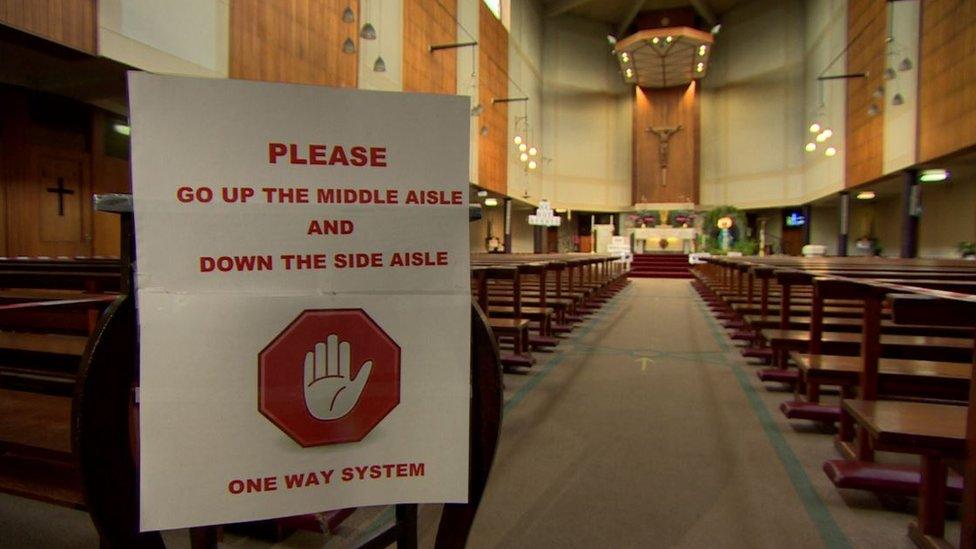
Places of worship have taken significant steps to make their buildings safer but there are still concerns
The Reverend Chris Hudson, Moderator of the Non-Subscribing Church of Ireland, said he would take decisions based on the advice of health officials.
"I would prefer to depend on those who know better than me, with regard to the medical advice and the science, and for them to instruct me or tell me it's important to close the church," he said.
"I don't have that knowledge that they have and throughout this pandemic I have respected the science, the medical advice and the information coming from particularly the Chief Medical Officer Michael McBride.
"Absolutely we would close the church if that's his belief, which it possibly will be."
Vulnerable and isolated
Mr Hudson expressed concern for vulnerable parishioners, including some asylum seekers, for whom a church service is "the only social contact they have during the week".
"We would have to, with respect to the authorities, to find some other way that we could continue giving them pastoral care even when the church is closed."
Ms Meban, who is a chaplain at Ulster University, agreed public church services were very important to many people who need contact in their lives.
But she added: "I think we are getting to a point where it's actually important for us as churches to say we're going to find creative other ways to look after the vulnerable; to reach out and care for the isolated.
"We can't put them at risk and we need to stand with the rest of the community."
Related topics
- Published24 November 2020

- Published24 May 2020
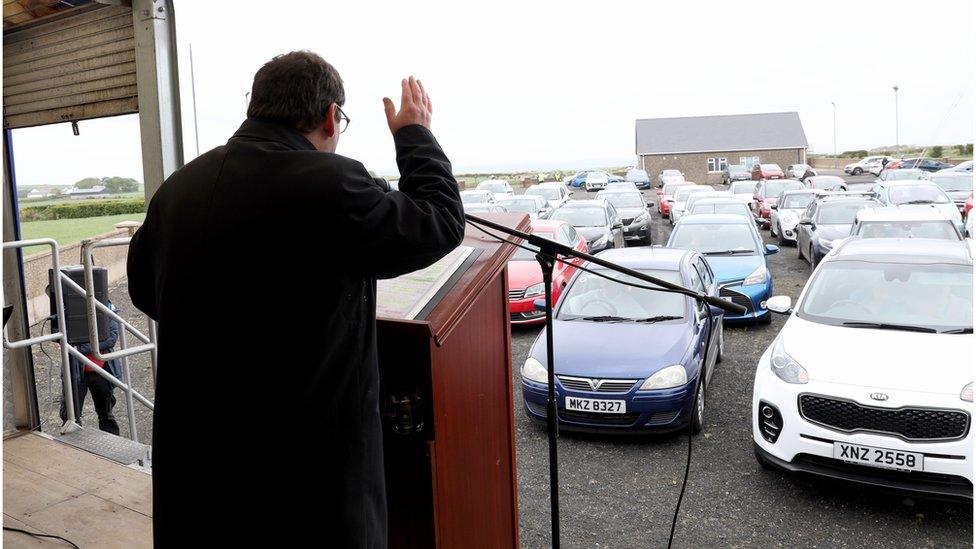
- Published28 June 2020
